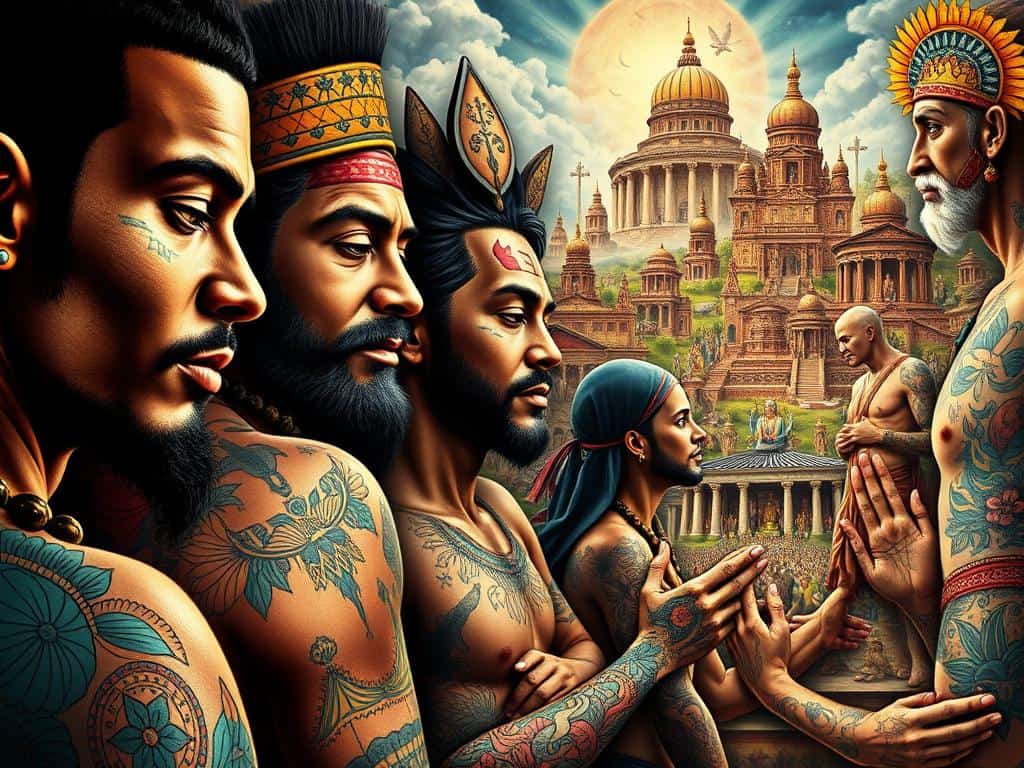As I touch the designs on my skin, I think about the stories they tell. Each tattoo is a spiritual ink that holds moments of victory, challenges, and my bond with something bigger. Tattoos have been around for thousands of years, showing who we are and what we believe. They go beyond just looks, carrying deep meanings and stories.
From old rituals to today’s views, Tattoos and Religious History are closely linked. They show our spiritual paths and beliefs. Let’s explore how tattoos, as a form of devotion, connect us to the divine.
Key Takeaways
- Tattoos have historically served various purposes, including religious significance and personal expression.
- Approximately 60% of individuals with tattoos report having designs that hold spiritual meanings.
- Tattooing has evolved significantly over the millennia, reflecting cultural shifts and acceptance.
- Modern views on tattoos are varied, with many seeing them as empowering, not taboo.
- Understanding the roots of tattoos can deepen our appreciation for this unique form of expression.
The Role of Tattoos in Religious Practices
Tattoos have many roles in religious practices. They mark faith, identity, and devotion. Through history, tattoos are linked with cultural rituals and spiritual beliefs. They show the values and beliefs of the communities that use them.
Across all eras and cultures, tattoos and spirituality are closely tied. They show the deep bond between human expression and divine acknowledgment.
Ancient Traditions and Rituals
In ancient times, tattoos had deep meanings tied to religion. In Egypt, tattoos were used in fertility rituals, showing a connection to deities. Tribal communities used tattoos to mark important life events or spiritual changes.
The Ainu, indigenous people of Japan, have a rich tattoo tradition. They believe tattoos can protect and heal, showing the spiritual depth of their culture.
Spiritual Significance Across Different Faiths
In today’s religions, tattoos are key to personal and communal identity. Coptic Christians in Egypt tattoo crosses on their bodies, showing their faith and strength. This act symbolizes solidarity and belonging.
In Islam and Judaism, views on tattoos vary. While permanent tattoos are often discouraged, temporary designs are common. This shows tattoos’ lasting role in personal expression and cultural preservation.
Tattoos and Religious History
Tattooing has a long and complex tattoo history that connects with many cultures and religions. The first tattoos were found over seven thousand years ago. They were more than just decorations; they held deep spiritual meanings.
As I look into this history, it’s amazing to see how tattoos have changed. They went from sacred symbols to today’s art forms.
Historical Context of Tattooing in Ancient Religions
In ancient times, tattoos showed who you were or your status. For example, Romans tattooed early Christians after Jesus’ death around 30 C.E. This shows the darker side of tattoo history.
But tattoos also grew in popularity among Christians. In places like Egypt and Syria, symbols like fish and crosses were common. Procopius of Gaza wrote about Christians getting crosses tattooed on their wrists, linking faith and body art during hard times.
Modern Interpretations and Practices
Today, tattoos have changed, but they keep their spiritual meanings. In Jerusalem, pilgrims get tattoos to mark their spiritual journeys. Wassim Razzouk, a famous tattoo artist, inks Christian symbols on pilgrims, linking past and present.
The Jerusalem cross is a popular design. It symbolizes Jesus’ sacrifice and the unity of believers. Tattoos remind us of our faith and identity, connecting ancient traditions with today’s beliefs.

The Controversial Viewpoints on Tattoos in Christianity
Christian views on tattoos vary widely. They are based on scripture and cultural views. Leviticus 19:28 is often cited, saying not to mark the body. This verse leads to many different opinions in Christian circles.
Some see tattoos as a way to express oneself. Others believe they go against what the Bible teaches. The history of tattoos adds depth to this debate, showing how views have changed over time.
Scriptural Interpretations
Leviticus 19:28 is the only Bible verse that talks about tattoos. The word “tattoo” didn’t come into use until the 17th century. Before then, translations spoke of “marks on the skin.”
The Hebrew word for tattoos means more than just tattoos today. It covers all kinds of skin markings. Early Christian leaders, like Tertullian in 213 AD, discussed tattoos and their cultural meanings. This shows the debate has been ongoing for a long time.
Cultural Stigma and Acceptance
Tattoos are often seen negatively in society. They have been linked to crime and rebellion. This has led to stereotypes about people with tattoos, making them seem less competent or more promiscuous.
Yet, many, including young people, embrace tattoos as a way to express their identity and faith. The Coptic Church’s tradition of tattooing shows tattoos can mean more than rebellion. They can also symbolize spiritual commitment.
Conclusion
Tattoos and spirituality have a deep connection that spans human history. With 40 million Americans having at least one tattoo, they show how tattoos have become a big part of who we are today. Tattoos are more than just art; they mark our faith and connect us to others.
More people are getting tattoos for their spiritual meaning. This shows a growing acceptance of tattoos as a way to express oneself. While some might see tattoos as wrong, many find them a way to share their spiritual journey.
Tattoos are not just about personal identity but also about community. As tattoos evolve, they will keep being a key part of our spirituality and self-expression. They connect us to our past and our creativity today.
